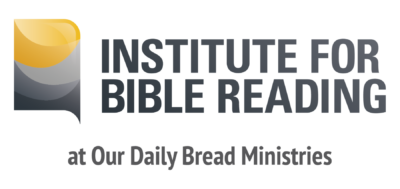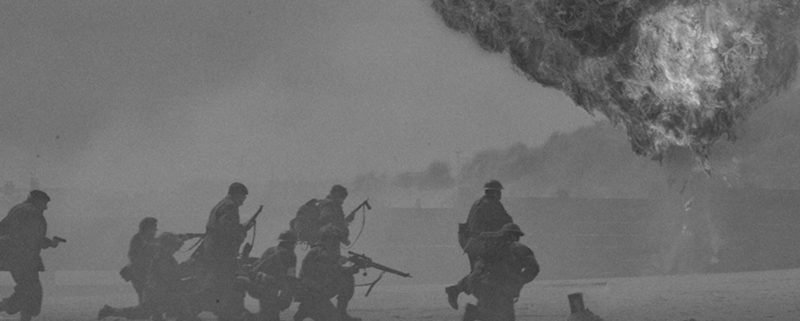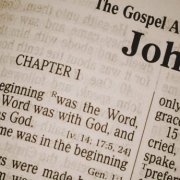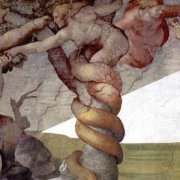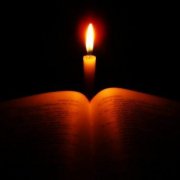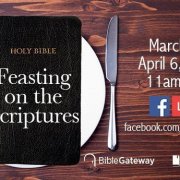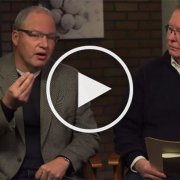The Bondage of Creation (Powers and Principalities pt. 4)
The contention of this series of articles is that the Bible is set in the land of wild things. That is, the Bible is more fantastical—beautiful, dangerous, and strange—than we give it credit for. What we incorrectly call the natural and the supernatural, as if they are distinct and isolated realms, are actually part of a single, fascinating, and intertwined world. In the Bible, heaven and earth constantly interact and are alive with all kinds of creatures, forces, and powers—both seen and unseen.
What are these powers? What do they do in the world? How do they operate? How do they relate to God, to humans, and to the story of rescue and redemption the Bible tells? It’s past time we re-engage the Bible’s overlooked story of the powers. The six articles cover the following major biblical topics:
- Ladies and Gentlemen, Meet the Powers
- The World-Rulers of this Darkness
- The Satan and the Law that Enslaves
- The Bondage of Creation
- Jesus’ Victory Over the Powers
- The Powers and the People of Jesus Today
* I am especially indebted to G. B. Caird’s small book Principalities and Powers for the main outline of this series (based on his Chancellor’s Lectures in 1954 at Queen’s University).
The Bondage of Creation
YHWH is indeed the lord of creation. When we question him and try to make our own case for how things should be, he answers:
Have you ever commanded the morning,
appointed the dawn to its place,
to seize the earth’s corners,
that the wicked be shaken from it?
-from Job 38 (The Hebrew Bible, Robert Alter)
YHWH’s power is great, and we see vivid pictures throughout the First Testament both of God’s attentive care for all his creatures (cf. Psalm 104), but also his ability to raise up ferocious elements to execute his judgments (cf. Psalm 77). There is one and only one Creator, and there is nothing within the world that can ultimately overcome his rule.
But still.
We have not actually seen what will ultimately be. We live in the time of penultimate.
There is a way it was all was meant to be, but it’s not the way it’s ended up. Not at all. At least not yet.
The Lord created a world and then he made image-bearers, meant to echo, channel, reflect, and imitate God’s own good and gracious rule to support and enhance flourishing life everywhere. That’s what it means to bear God’s image. These human servants were intended to carry forward and implement God’s grace and peace to every thing in every way.
What is man that You should note him,
and the human creature, that You pay him heed,
and You make him little less than the gods,
with glory and grandeur You crown him?
You make him rule over the work of Your hands.
All things You set under his feet.
-from Psalm 8 (The Hebrew Bible, Alter)
But the great rebellion changed everything. As we have already seen, the overreach of the human creatures was ironically an underperformance, leading to the rise of the world-rulers of our present darkness. In the biblical story, this has affected all people — Jew and Gentile alike. Everyone is in bondage to wrongdoing and mortality.
In a world we were meant to rule, we are now ruled. The powers have had their way with us.
And not only with us.
In a world we were meant to rule, we are now ruled. The powers have had their way with us.
If we read the narrative closely, we see that the disruption brought on by the principalities and powers extends throughout all of creation. We learn immediately at the very start of the story that the destiny of humanity and the rest of the world are tied intimately together. When image-bearers fell, the earth too was dragged down.
Evil is not merely a human problem. Evil is a cosmic disaster affecting everything.
In the Bible’s account of the powers, this is expressed in various ways. One very strange part of the picture is that elements of the creation itself seem to easily revert to a kind of rebelliousness against God’s good order. The demons and the powers of chaos have been forced back to the boundaries of the world, but they are not yet completely defeated. When things go wrong (mostly, when human beings are derelict in their moral duties) these powers can spring right back into disruptive action.
So in the prophet Isaiah, for instance, we find passages describing the effects of God’s judgment on wicked nations. When evil people are defeated, their land reverts to a wasteland where unruly plants and wild creatures take over:
Thorns shall spring up in her citadels,
in her fortresses nettles and briars,
and it shall turn into an abode of jackals,
a courtyard of ostriches.
And wildcats shall meet hyenas,
and the satyr shall call to its mate.
There Lilith shall rest
and find repose for herself.
-from Isaiah 34 (The Hebrew Bible, Alter)
Wait . . . what was that? Satyrs the demon goat-gods? Lilith the night hag? They are back in the land?
This is how the story communicates the dark side of the animal world, long known in folklore, in which unclean creatures consort with the evil spirits, eager to wreak their havoc. Nature red in tooth and claw indeed.
In the Bible’s story, there really are wildlands where the wild things really are in charge. With the world under the powers, the peaceable kingdom remains a prophetic vision, not a present reality.
Along the same line, the Scriptures speak of the continuing powers of chaos, usually housed in the great and riotous sea, ready at any time to undermine good order and reintroduce anarchy. The First Testament refers to Rahab, Leviathan, and Tehom Rabbah (the Great Deep). We can see the great and ongoing battle in the Creation and the Exodus stories. The Chaos King lives in the water, God first subdued him to shape and order the world, and then he cleft the sea again to rescue his people from slavery. As Psalm 74 has it:
Yet God is my king of old,
worker of rescues in the midst of the earth.
You shattered the sea god with Your strength,
You smashed the monsters’ heads on the waters.
You crushed the Leviathan’s heads,
You gave him as food to the desert-folk.
– (The Hebrew Bible, Alter)
And in the Scriptures, the story works through recapitulation. As it has been, so it will be. The shape of the narrative is constantly replaying earlier patterns. In the future time of salvation and rescue, God will act with power again:
On that day the Lord shall punish
with His fierce and great and mighty sword
Leviathan the slippery serpent,
Leviathan the twisting serpent,
and shall slay the dragon that is in the sea.
– from Isaiah 27 (The Hebrew Bible, Alter)
God’s stance vis-à-vis these powers of the natural world is that of a Divine Warrior. He clashes with them. The Bible is a battle story. The promise of the Bible is specifically about how the battle will go.
The Bible’s Lens on Our World
As good children of modernity, we have been taught for a long time that all such speculations about demons, nature gods, and powers are really nothing at all. I would submit that all too often even those of us who ostensibly accept the biblical storyline are functional materialists in our day-to-day outlook.
None of this talk of powers, demon-creatures, and mythical beasts comports well with our typically scientific, and let’s be honest, mostly naturalistic view of the world today. But this is precisely the point: the Bible is telling us that there is more to the world than meets the rationalistic eye.
So the world is not what it seems. Not all the powerful actors in this drama are human. There are great and mighty gods of this age, and while we may not use the ancient mythopoetic language of the Bible to describe them, we should not doubt their existence nor their ongoing role in the story.
In the end, the Bible’s view of the creation is therefore mixed. It is always first and foremost the good place God made for us. God cares for it, provides for it and all its creatures, and it has its own place in his coming redemption of all things. But just as the human drama has suffered a deadly disruption, so too has the story of the creation. The world rulers of this darkness have turned the world upside down—and the baneful ramifications run right through the cosmos, from top to bottom.
Bondage is the word that captures the essence of this story. Humans are in slavery to sin and death. The creation is captive to corruption, decay, and disaster. There are moral failures, and there are natural disasters. There are deliberate acts of evil, and there are pandemics.
Which brings us to the Apostle Paul, a man of two worlds—Hellenistic and Jewish. From the Greek side of the story, he knew all about the endless, repeating cycles of the natural world. He was aware of how ancient astrology had weighed down the hearts of so many with its sense of all-pervading futility. From the Jewish side he knew the Scriptures and the painful curse that had fallen on the land.
But Paul also believes this is not a permanent bondage, nor a story of endless cyclical affliction:
This is how I work it out. The sufferings we go through in the present time are not worth putting in the scale alongside the glory that is going to be unveiled for us. Yes: creation itself is on tiptoe with expectation, eagerly awaiting the moment when God’s children will be revealed. Creation, you see, was subjected to pointless futility, not of its own volition, but because of the one who placed it in this subjection, in the hope that creation itself would be freed from its slavery to decay, to enjoy the freedom that comes when God’s children are glorified.
Let me explain. We know that the entire creation is groaning together, and going through labor pains together, up until the present time. Not only so: we too, we who have the first fruits of the spirit’s life within us, are groaning within ourselves, as we eagerly await our adoption, the redemption of our body.
-from Romans 8 (Kingdom New Testament)
How did this dream of a New Exodus become possible? Where does this hope come from? Who brings this breaking of the chains that bind the creation?
We’ve explored the devastating effects wrought by the evil powers. Now it’s time to turn to the one who came to take them on.
Part 5: Jesus’ Victory Over the Powers >>>
